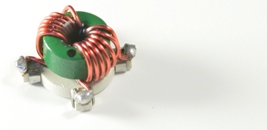Common Mode Choke |
| |
 |
| |
About Common Mode Choke
Consider a common mode choke as a transformer with two or more windings with equal number of turns. If tightly coupled, the common mode choke provides a high impedance to the common mode interference while it is minimal in differential-mode signal paths.
Common mode chokes connect multiple electrical devices to a given power line generating high frequency noise and interfering with the operations of computers or any other electronic device.
The common mode choke (also known as inductors) have a primary winding around a ferrite rod and around it, the secondary, to minimize leakage inductance of the primary winding. A ferrite frame closes the magnetic field lines and an air gap remains present between the rod and the frame.
The optimum core material needs to be chosen carefully for the common mode chokes. It is the frequency range of an electrical noise that must be considered first; if it’s only power frequency noise to be dealt with, then laminated silicon steel is enough. For the upper audio range, moly-permalloy powders are sufficient whereas for noise frequencies exceeding 20 kHz. the ferrite materials that prove the best because of the resistive component helping to maintain sufficiently high impedance values.
Applications:
- To reduce common mode electrical noises.
- To filter common mode EMI currents preventing signal and voltage degradation.
|
| |
| |
| |
| |
